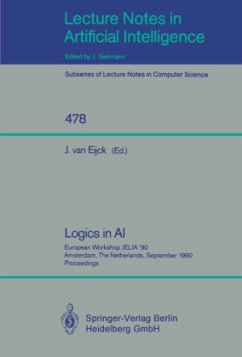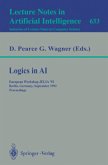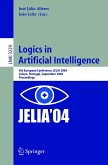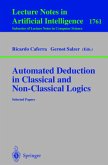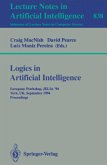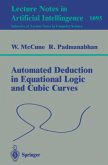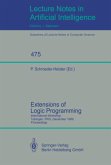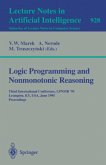Jan van Eijck (ed.)European Workshop JELIA '90, Amsterdam, The Netherlands, September 10-14, 1990. Proceedings
Logics in AI
European Workshop JELIA '90, Amsterdam, The Netherlands, September 10-14, 1990. Proceedings
Mitarbeit:Eick, Jan van
Jan van Eijck (ed.)European Workshop JELIA '90, Amsterdam, The Netherlands, September 10-14, 1990. Proceedings
Logics in AI
European Workshop JELIA '90, Amsterdam, The Netherlands, September 10-14, 1990. Proceedings
Mitarbeit:Eick, Jan van
- Broschiertes Buch
- Merkliste
- Auf die Merkliste
- Bewerten Bewerten
- Teilen
- Produkt teilen
- Produkterinnerung
- Produkterinnerung
The European Workshop on Logics in Artificial Intelligence was held at the Centre for Mathematics and Computer Science in Amsterdam, September 10-14, 1990. This volume includes the 29 papers selected and presented at the workshop together with 7 invited papers. The main themes are: - Logic programming and automated theorem proving, - Computational semantics for natural language, - Applications of non-classical logics, - Partial and dynamic logics.
Andere Kunden interessierten sich auch für
![Logics in AI Logics in AI]() David Pearce / Gerd Wagner (eds.)Logics in AI39,99 €
David Pearce / Gerd Wagner (eds.)Logics in AI39,99 €![Logics in Artificial Intelligence Logics in Artificial Intelligence]() Alferes, Jose, Julio / Joao Leite (eds.)Logics in Artificial Intelligence77,99 €
Alferes, Jose, Julio / Joao Leite (eds.)Logics in Artificial Intelligence77,99 €![Automated Deduction in Classical and Non-Classical Logics Automated Deduction in Classical and Non-Classical Logics]() Ricardo Caferra / Gernot Salzer (eds.)Automated Deduction in Classical and Non-Classical Logics39,99 €
Ricardo Caferra / Gernot Salzer (eds.)Automated Deduction in Classical and Non-Classical Logics39,99 €![Logics in Artificial Intelligence Logics in Artificial Intelligence]() MacNishLogics in Artificial Intelligence39,99 €
MacNishLogics in Artificial Intelligence39,99 €![Automated Deduction in Equational Logic and Cubic Curves Automated Deduction in Equational Logic and Cubic Curves]() R. PadmanabhanAutomated Deduction in Equational Logic and Cubic Curves39,99 €
R. PadmanabhanAutomated Deduction in Equational Logic and Cubic Curves39,99 €![Extensions of Logic Programming Extensions of Logic Programming]() Peter Schroeder-Heister (ed.)Extensions of Logic Programming39,99 €
Peter Schroeder-Heister (ed.)Extensions of Logic Programming39,99 €![Logic Programming and Nonmonotonic Reasoning Logic Programming and Nonmonotonic Reasoning]() Logic Programming and Nonmonotonic Reasoning39,99 €
Logic Programming and Nonmonotonic Reasoning39,99 €-
-
-
The European Workshop on Logics in Artificial Intelligence was held at the Centre for Mathematics and Computer Science in Amsterdam, September 10-14, 1990. This volume includes the 29 papers selected and presented at the workshop together with 7 invited papers. The main themes are: - Logic programming and automated theorem proving, - Computational semantics for natural language, - Applications of non-classical logics, - Partial and dynamic logics.
Hinweis: Dieser Artikel kann nur an eine deutsche Lieferadresse ausgeliefert werden.
Hinweis: Dieser Artikel kann nur an eine deutsche Lieferadresse ausgeliefert werden.
Produktdetails
- Produktdetails
- Lecture Notes in Computer Science 478
- Verlag: Springer / Springer Berlin Heidelberg / Springer, Berlin
- Artikelnr. des Verlages: 978-3-540-53686-4
- 1990.
- Seitenzahl: 580
- Erscheinungstermin: 26. Februar 1991
- Englisch
- Abmessung: 235mm x 155mm x 32mm
- Gewicht: 970g
- ISBN-13: 9783540536864
- ISBN-10: 3540536868
- Artikelnr.: 09224543
- Herstellerkennzeichnung
- Springer-Verlag GmbH
- Tiergartenstr. 17
- 69121 Heidelberg
- ProductSafety@springernature.com
- Lecture Notes in Computer Science 478
- Verlag: Springer / Springer Berlin Heidelberg / Springer, Berlin
- Artikelnr. des Verlages: 978-3-540-53686-4
- 1990.
- Seitenzahl: 580
- Erscheinungstermin: 26. Februar 1991
- Englisch
- Abmessung: 235mm x 155mm x 32mm
- Gewicht: 970g
- ISBN-13: 9783540536864
- ISBN-10: 3540536868
- Artikelnr.: 09224543
- Herstellerkennzeichnung
- Springer-Verlag GmbH
- Tiergartenstr. 17
- 69121 Heidelberg
- ProductSafety@springernature.com
Commonsense entailment: A modal theory of nonmonotonic reasoning.- Gaggle theory: An abstraction of Galois connections and residuation, with applications to negation, implication, and various logical operators.- Belief revision and nonmonotonic logic: Two sides of the same coin?.- Two theories of dynamic semantics.- What is a Horn clause in partial logic?.- Semantic interpretation as higher-order deduction.- Action logic and pure induction.- Loop checking and negation.- On generative capacity of the Lambek calculus.- Extending resolution for model construction.- A first order logic of truth, knowledge and belief.- The optimal model of a program with negation.- NM3 - A three-valued cumulative non-monotonic formalism.- Constructive matching - A methodology for inductive theorem proving.- Deductive inference operations.- A constraint logic approach to modal deduction.- Dynamic semantics and VP-ellipsis.- Systems for knowledge and beliefs.- Awareness, negation and Logical omniscience.- Theoretical circumscription in partial modal logic.- A logical basis for object oriented programming.- A computationally attractive first-order logic of belief.- Polymorphic constructs in natural and programming languages.- The net-clause language - A tool for data-driven inference.- The logical compilation of knowledge bases.- Non-monotonic reasoning by monotonic means.- Anaphora and the logic of change.- Towards automatic autoepistemic reasoning.- Towards a connection procedure with built in theories.- On the equivalence of deferred substitution and immediate substitution semantics for Logic Programs.- Towards a formal theory of intentions.- Note on effective constructibility of resolution proof systems.- The logic of objective knowledge and rational belief.- A complete logic forautoepistemic membership.- Doxastic preference logic.- Partial semantics for truth maintenance.
Commonsense entailment: A modal theory of nonmonotonic reasoning.- Gaggle theory: An abstraction of Galois connections and residuation, with applications to negation, implication, and various logical operators.- Belief revision and nonmonotonic logic: Two sides of the same coin?.- Two theories of dynamic semantics.- What is a Horn clause in partial logic?.- Semantic interpretation as higher-order deduction.- Action logic and pure induction.- Loop checking and negation.- On generative capacity of the Lambek calculus.- Extending resolution for model construction.- A first order logic of truth, knowledge and belief.- The optimal model of a program with negation.- NM3 - A three-valued cumulative non-monotonic formalism.- Constructive matching - A methodology for inductive theorem proving.- Deductive inference operations.- A constraint logic approach to modal deduction.- Dynamic semantics and VP-ellipsis.- Systems for knowledge and beliefs.- Awareness, negation and Logical omniscience.- Theoretical circumscription in partial modal logic.- A logical basis for object oriented programming.- A computationally attractive first-order logic of belief.- Polymorphic constructs in natural and programming languages.- The net-clause language - A tool for data-driven inference.- The logical compilation of knowledge bases.- Non-monotonic reasoning by monotonic means.- Anaphora and the logic of change.- Towards automatic autoepistemic reasoning.- Towards a connection procedure with built in theories.- On the equivalence of deferred substitution and immediate substitution semantics for Logic Programs.- Towards a formal theory of intentions.- Note on effective constructibility of resolution proof systems.- The logic of objective knowledge and rational belief.- A complete logic forautoepistemic membership.- Doxastic preference logic.- Partial semantics for truth maintenance.

